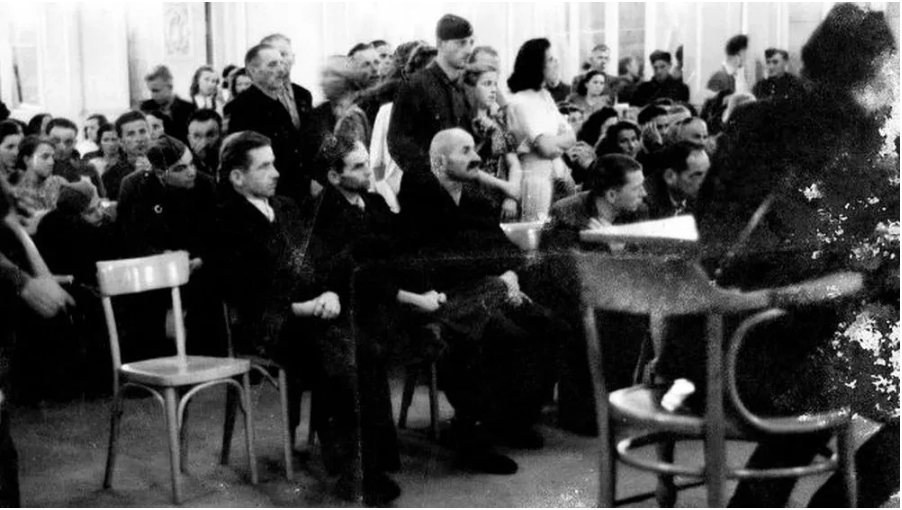By: Domen Mezeg / Nova24tv
In a book entitled “The Nation Judges” (Narod sodi in Slovenian) by Mateja Čoh Kladnik, we find examples of forced expropriation of the rich after the end of World War II. The Communist Party justified its vile behaviour with claims of the rich “collaborating” with the occupiers during the war. Thus, the revolutionaries amassed a great amount of “state” property. This story is important for a better understanding of the origins of the Social Democrats’ real estate and the party’s hysterical attempts to pass the blame on to others through the judiciary that serves them. They would especially like to pass the blame for their vile actions to those who dare point the finger at their disputed assets. And this is how the story from decades ago is repeating itself – that is, the story of the abuse of the judiciary. In addition, attention is once again being diverted from the fact that the Jewish community had suffered greatly from nationalisation. In the following article, we will present how the communists took over the money institutions.
“The second major trial due to economic cooperation with the occupiers happened on the 21st of August 1945, also before the senate of the Court of Slovenian National Honour in Ljubljana. Representatives of two large monetary institutions, Ljudska posojilnica (The People’s Loan Bank) and Prometna Banka (Traffic Bank), were convicted at the trial in question.” The following persons found themselves on trial: dean Matija Škrbec from Kranj, Mayor of Ježica Franc Sever, professor Karel Dermastija, director of Ljudska posojilnica Dr Franc Kržan, landowner Franc Leskovic, professor Vojteh Hybašek, and professor Dr Alfonz Levičnik.
The remaining victims of the trial were: the principal of a high school Josip Osana, former district governor Franc Maršič, professor Dr Pavel Simončič, landowner Ivan Keber, landowner and university professor Dr Andrej Snoj, director of a museum Dr Josip Mal and Dr Valentin Meršol. The above were accused of depositing the money from the loan bank into the account of a monetary institution owned by the occupier, meaning the so-called “Banca di Italia” – bank of Italy, or of approving and executing the investment between 1941 and 1943, as representatives of Ljudska posojilnica and Prometna banka.
They were also accused of approving the signing of Italian treasury bills, which were intended solely for the arming of the Italian army. The post-war authorities also accused the aforementioned men of taking out a loan from the aforementioned bank, which they supposedly spent for the most part, and even indulged in lively money business with two banks – Banca di Italia and Banca di Roma, while also providing them with deals worth millions of lire. The authorities also accused the men of donating several thousand lire to the “diocesan charity office in Ljubljana, Šrkbec Matija.”
Loss of national honour, forced labour and confiscation of property
Šrkbec was also said to have been paid thousands of lire from secret reserve funds and even granted a high loan with a very low interest rate. The above were also accused of “performing a lending and treasury service in the years from 1942 to 1945, under the guise of the Diocesan Charitable Office, for the organisation of domestic traitors.” Škrbec was sentenced to eight years of loss of national honour, six years of hard forced labour, and confiscation of all his property for the benefit of the state.
Sever was punished with a six-year period of loss of national honour, five years of hard physical labour, and confiscation of property. Dermastia, on the other hand, was sentenced to three years of loss of national honour, two years of easier forced labour, and confiscation of all his shares in various companies. The court also convicted Kržan, Leskovic, Hybašek, Levičnik and Osana, and acquitted the others. “The most important consequence of the process was that Ljudska posojilnica and Prometna banka were confiscated for the benefit of the state.”
In her book, the author Čok Kladnik also explains how the so-called “Courts of Slovenian National Honour” were created: “The revolutionary takeover of power was then followed by a period of severe repression, which lasted until the early 1950s.” At the time, the Communist Party of Slovenia consolidated its power and political monopoly through all kinds of repressive measures that grossly and systematically violated human rights and fundamental freedoms. Together with the Yugoslav Army, the Department for People’s Protection (OZNA) and the People’s Defence Corps of Yugoslavia, it tackled the so-called “cleaning.”
“There were concentration and labour camps, there were many politically motivated lawsuits against the (alleged) opponents of the new system, there were many confiscations of property in favour of the state (confiscations, agrarian reforms, nationalisation), and many people were expelled from their hometowns” during the process of the so-called “cleaning” and consolidation of power. As a result, a number of processes with a political background emerged at the time.

